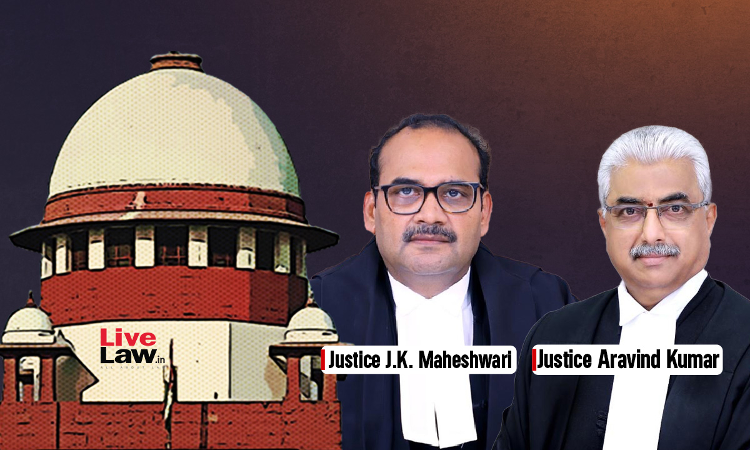- Home
- /
- Supreme court
- /
- WB Premises Tenancy Act | Tenant...
WB Premises Tenancy Act | Tenant Not Protected From Eviction If Admitted Rent Not Deposited Within Time As Per S.7 : Supreme Court
Yash Mittal
17 Aug 2025 3:57 PM IST
Interpreting the West Bengal Premises Tenancy Act, 1997 (“Act”), the Supreme Court recently ruled that once an eviction summons is served on a tenant, the statutory 30-day period for depositing arrears of rent along with applicable interest is mandatory and cannot be extended by invoking Section 5 of the Limitation Act. The bench of Justices J.K. Maheshwari and Aravind Kumar dealt with...
Interpreting the West Bengal Premises Tenancy Act, 1997 (“Act”), the Supreme Court recently ruled that once an eviction summons is served on a tenant, the statutory 30-day period for depositing arrears of rent along with applicable interest is mandatory and cannot be extended by invoking Section 5 of the Limitation Act.
The bench of Justices J.K. Maheshwari and Aravind Kumar dealt with a case where the appellant-tenant failed to deposit the admitted rent within the statutory 30-day period and subsequently filed a belated application for determination of rent along with a plea under Section 5 of the Limitation Act. Since both mandatory conditions to avoid eviction timely payment of rent within 30 days and filing an application for rent determination within the same period were not met, the High Court declined to grant him relief, leading to his appeal before the Supreme Court.
Affirming the High Court's decision, the judgment authored by Justice Maheshwari observed:
"Thus, in case of disputed rent, this Court was of the view that to avail the benefit of protection against eviction under the WBPT Act, the tenant has to do the following to avoid eviction, first, to deposit rent admitted by him to be due; second, an application for determination of rent payable be filed along with. The tenant had neither deposited, nor paid the admitted rent and had only filed the application for determination of rent belatedly along with an application under Section 5 of the Limitation Act, 1963.”
An attempt was made by the Appellant to take a benefit out of proviso to Section 7(2) of the Act, which vests a discretion upon the Civil Judge to extend the time period against the eviction, however, the court said that such a benefit can only be availed when the tenant satisfies the twin conditions of depositing the rent along with an application for determination of rent within 30 days.
“Be that as it may, in the present case, neither the rent as specified under Sections 7(1) and 7(2) has been paid or deposited by the tenant, nor the application for determination of rent has been filed within the period of thirty days as prescribed. Therefore, in the absence of fulfilment of these twin conditions, tenant cannot avail the benefit of protection against eviction as envisaged under Section 7 of WBPT Act.”, the court said.
“As such, the inescapable conclusion in the facts and the law as discussed hereinabove, is that the compliance as required to be done by the tenant in Section 7(1)(a)(b)(c) and first part of Section 7(2) regarding deposit of rent and filing an application within the same time is mandatory. In default, they cannot avail the benefit of the proviso of sub-section (2) which only relates to the payment of determined amount of rent and whereby the Civil Judge may exercise the discretion to grant extension of time.”, the court added.
Since, the application for rent determination was filed with 17 days delay, thus the Court found that the benefit would not accrue to the Appellant, and the defence against the delivery of possession would be struck out as per Section 7(3) of the Act.
“Therefore, the rent was required to be deposited within thirty days along with an application immediately on reopening of Courts, but application was filed with a delay of 17 days on 14.11.2022. Therefore, due to non-compliance of deposit and filing of an application within the prescribed period of 30 days, the consequence as specified in sub-section (3) of Section 7 shall follow. The benefit of proviso with respect to the extended time would not be available to the appellant prior to rent determination stage.”, the court said.
Accordingly, the appeal failed and was dismissed.
Cause Title: SEVENTH DAY ADVENTIST SENIOR SECONDARY SCHOOL VS. ISMAT AHMED AND ORS.
Citation : 2025 LiveLaw (SC) 811
Click here to read/download the judgment
Appearance:
Mr. Uday Gupta, Sr. Adv. argued for the appellants
Mr. Swarnendu Chatterjee, Adv. argued for the Respondents
Mr. Nidhesh Gupta, Sr. Adv. as amicus curiae



